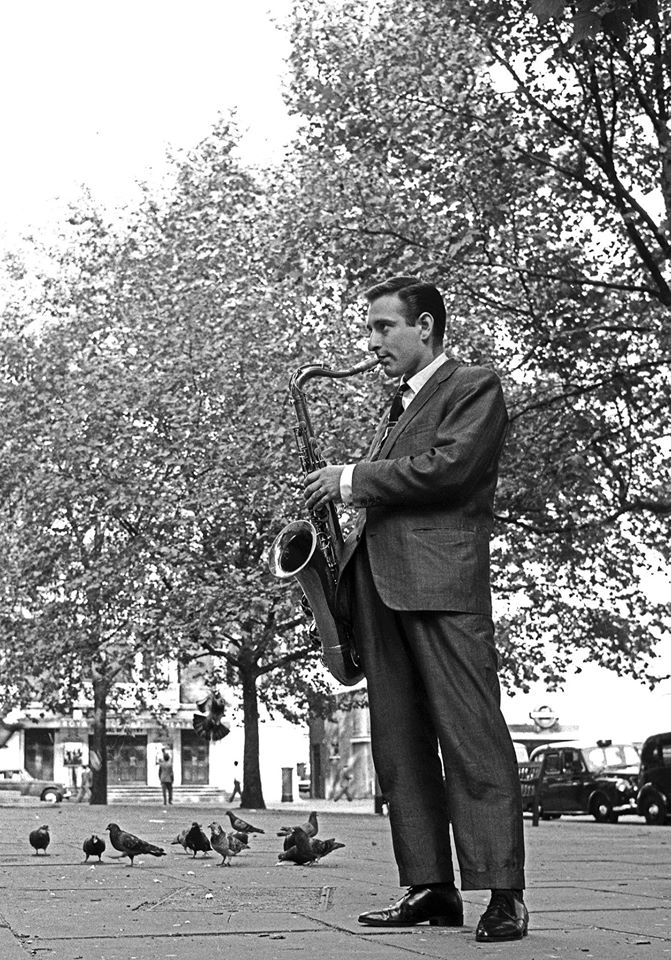‘Fight The Good Fight!’

Bobby Wellins
24 January 1936 – 27 October 2016
This is not intended as an obituary so much as a tribute, so please forgive the omission of any material you expected to see here.
I say this because what emerged yesterday at Bobby’s funeral in Chichester was an overwhelming sense that Bobby had touched so many in a personal way, and that they/we all had our own stories and perspectives of the unique and wonderful artist and person that was Bob Wellins.
There were the ‘dark years’ of the late ‘60s, not the easiest of material to take on board, but within which came the inevitable fun and creativity of Bobby’s ongoing partnership with Stan Tracey, his encounters with the great players who were visiting Ronnie Scott’s – Dexter Gordon, Sonny Rollins, Roland Kirk, Dizzy Gillespie, Ben Webster, Chet Baker – and the creative strides forwards for British jazz from underneath the shadow of the great American art form.
Indeed, a recently recorded Kenny Wheeler album, Six For Six, (featuring Bobby) attests to the fact that coming from within the ensembles of the 50s and 60s, and creating such creative directions heralded on ‘Starless And Bible Black’, for instance, he was part of the vanguard of British players making the music their own to an extent that is the bedrock of the British-European sound now.
Bobby thought his way into creative answers and pragmatic solutions – his improvisation always alert, adept, and referencing the greats, whilst forming its own language; his compositions, like ‘C.U.C.B.’ and ‘Silent Waves’, always ambitious and three-dimensional, whilst still formed around a gig-able lead-sheet.
His arrangements of standard material are unique to him. Not only would he take an unlikely dance hall song like Moonray [form Artie Shaw in 1947], but also mainstream hits like ‘Mad About The Boy’, ‘How Deep Is The Ocean’, and ‘Quando, Quando’, and make them his own. The groove or presentation would be unexpected, and the manipulation of the melody entirely personal to him.
If you listen carefully, there is plenty of Lester Young, Charlie Parker, Stan Getz, Zoot Sims, John Coltrane, Sonny Rollins, and many more in his playing… but what we are left with is an abiding sense that we’ve heard something entirely original. As Sonny Rollins recently said in a tribute: ‘He has his own sound’.
This unique sound had the plaintive quality of a folk singer rising to or falling from a note, the measured vibrato of Middle-Eastern soloistic virtuosity, a marked absence of crass sentimentality or over-projection, and a starkly incisive rhythmic propulsion known in the game as ‘swing’.
For those to whom Bobby’s tone and musicianship spoke, we all rated him as highly as any artist in the field of jazz music. I have always announced him as one of maybe a dozen original tones on the saxophone in all jazz.
Bob was undeniably frustrated by the pitfalls and inadequacies of the public performance arena of jazz in the UK. He was faultlessly humble, if constructively competitive, so his analysis was always one of pushing forward the cause of jazz, rather than any defined personal ambition. He would compare Stan Getz’s articulate attitude towards the lighting man, in comparison to our shuffling unconcern on a sound check. He wanted theatre and a sense of the dramatic to be in place to help serve up the inner content of the music. He believed in literature, poetry and fine art as siblings to jazz music, and wanted jazz in the UK to be granted the cultural capital and respect it enjoys the world over.
Bobby was a great appreciator of his fellow artists – explaining cogently what he liked about the players around him with an open heart – whether they corresponded with his style or not. He was a tireless promoter of musicians to each other – mentioning to me before I met or played with them, Claire martin, and Pete Jacobsen, for instance. And in this way, he was always in touch with new players coming through, and willing to place them on a stand under his name.
Bobby was a wily Scot and a survivor, but came with a charisma and hard won wisdom and warmth that he readily gave of.
I first heard Bob when I was 15 and connected with his approach and sound immediately; hung with him at university where he was composer in residence; fell out with him over a social incident; stuck up for him in amongst criticism of his conduct within the scene; heard his sound again from the street whilst passing a venue when he was on a sound check, went in and put water under the bridge; joined him on a UK tour and BBC broadcast – all this before I was 23.
After this came years of regular visits each way, involving music-making, listening, hanging with friends and talking about everything – one visit though, I particularly want to share.
I had just moved into another single room with my one-and-a-half year-old daughter, and to be honest, was struggling with exhaustion and feeling more than a little daunted at the prospect of managing her life on my own. Bob called and said he was on his way over. He engaged magically with little Rosebud, and when we were sat on a bench with her in a local park, later that day he said: ‘Julian, she’s got you.’
I’m aware that anyone can hand out platitudes, but just as Dave Holland had to be told by Miles Davis ‘you are the bass’, I instantly felt reassured that just being there was enough. Thanks Bob. I’ll miss you, old mate.
Julian Nicholas



